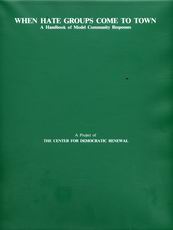
When Hate Groups Come to Town
A Handbook of Model Community Responses
Williams, Randall; Wells, Lyn (eds.)
Publisher: Center for Democratic Renewal (formerly the National Anti-Klan Network), Atlanta, USA
Year Published: 1986
Pages: 146pp Resource Type: Article
Cx Number: CX4602
A handbook for dealing with hate groups in communities across North America, dealing with the nature of such groups and how they work and how communities can band together to combat them.
Abstract:
This project of the Centre for Democratic Renewal is a handbook for dealing with hate groups in communities across North America. It is an informative resource about the nature of such groups and how they work, which allows communities to band together to combat widespread racism.
It is divided into three sections. The first is an introduction to the issue, focused on Ku Klux Klan, but also has adaptable solutions for other hate groups. The second section addresses special concerns such as the role of churches and clergy, how the media can be involved, the vulnerability of public schools for hate propaganda and the problem of state governments that do not have human rights panels. The third section is a collection of case studies that show how specific communities have dealt with countering hateful organizations. These cases are useful because different types of communities may be more successful using different tactics to fight racism.
The KKK still poses a threat to societies all across North America. This guide provides a historical background to the problem, as well as statistics to show that organised hate crimes still occur today. The KKK deteriorates race relations in any community, and this guide shows how they can be eliminated quickly and effectively. This is a civic defence handbook against hatred and violence, and it describes poor responses to hate groups so that they might be learned from. Racism is still widespread today, and according to the guidebook, "most communities outside the South which encounter the Klan may have experienced racial troubles, but have not confronted the Klan since the 1920s. Perhaps the first lesson to be learned from the Klan's current resurgence is that no one area or section of the country has a monopoly on racism and racial problems." Any community can be affected by the manipulations of a hate group and, according to this guide, any community can respond effectively to eliminate the threat.
[Abstract by Mia Manns]
Table of Contents
Preface
Introduction
The Nature of the Problem
What to Expect After the Clan Arrives
Framing a Response to the KKK
Models for Community-Based Organizations
Special Concerns
Church and Clergy
Human Relations Commissions
Media
Schools
Legal Responses
Law Enforcement
Community and Police
Business
Labor
Local and State Governments
Case Studies
Organizing for Change - Contra Costa, CA
Why the Clan Can't be Ignored - Decatur, AL
A State Model - Georgia
Creating An Anti-Klan Climate - Nashville, TN
Fighting the KKK in the Courts - Texas Gulf Coast
When the Klan is the Community - Wrightsville, GA
Klan, Anti-Klan Confrontation - Meridan, CT
Dealing with an Epidemic of Hate - Montgomery Co., MD
Victims Lead a Response - Pottersville, MD
The Preventive Approach - Hopkinsville, Kentucky
Subject Headings


